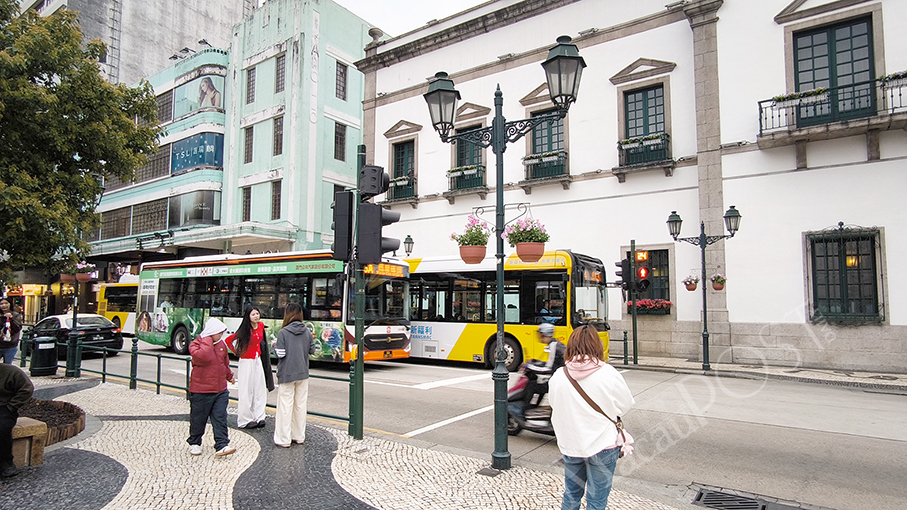The Transport Bureau (DSAT) says that it has requested the city’s two public bus operators to gradually increase the number of their vehicles and drivers with the aim of coping with an expected continuous increase in the number of passengers.
Lau Nga Hong, who heads the bureau’s Transport Management Division, made the remarks when attending a current affairs phone-in programme last week hosted by Ou Mun Tin Toi, the Chinese-language radio channel of public broadcaster TDM.
Lau pointed out that according to his bureau’s data, Macau recorded 227 million public bus passengers in 2024, or a daily average of 624,700, an increase of 6.4 percent from 2023.
Lau noted that last year’s number of public bus passengers was almost close to the 229 million recorded in 2019, the highest on record.
According to DSAT data on its website, at the end of last year the two public bus operators had a total of 1,007 buses, of which 929 were new energy vehicles (NEVs), comprising 50 natural gas buses and 879 extended-range electric buses.
According to specialist websites, extended-range electric vehicles have a plug-in battery pack and an electric motor, as well as an internal combustion engine. The electric motor is used for driving the wheels, while the internal combustion engine is only used as a generator to recharge the battery when it is depleted.
‘Pure e-buses’
Lau said that with the aim of alleviating the city’s overcrowded public bus services, as well as with the expected commencement of habitation in newly developed urban areas later this year, his bureau will consider adjusting and optimising the city’s public bus route network, adding that the bureau requires the two public bus operators to gradually increase the number of their vehicles and drivers.
Lau also said that the new public buses to be purchased in the near future will include pure e-buses* for the first time.
While pure e-vehicles are exclusively powered by an on-board battery pack, thereby generating zero emissions, extended-range e-vehicles still generate minimal emissions as they are equipped with a small internal combustion engine used as a generator to recharge the battery.
Secretary for Transport and Public Works Raymond Tam Vai Man told lawmakers last month that the city’s fleet of public buses will have pure e-buses for the first time, which were expected to hit the road in the near future, adding that they will be operated on overnight routes first.
Radio taxi company wants extension
Meanwhile, speaking to reporters on Wednesday, Macau Radio Taxi Services Limited noted that the licences of 100 of its 300 radio taxis are scheduled to expire on September 30 this year, adding that the company has applied to the government to extend their duration for some time.
The government is yet to decide whether to agree to the extension.
The company’s first 100 came into service on April 1, 2017, while the other 200 came into operation on December 1, 2019.
Licences of the city’s radio taxis were initially slated to be valid for eight years, but they were extended for a further six months due to the adverse impact of the COVID-19 pandemic. The licences of the other 200 radio taxis, according to the DSAT website, are now scheduled to expire on May 31, 2028.
According to its agreement with Macau Radio Taxi Services Limited, the government, in public interest, can extend the duration of some or all of the company’s radio taxi licences for a certain period of time.
More specifically, according to the agreement, the government can assess the feasibility of extending all or some of the company’s radio taxi licences and determine the extension’s duration, after considering the company’s service quality, civil society’s demand for radio taxi services, and the public interest.
The company said on Wednesday that if the 100 radio taxis licences are not extended, the company’s capacity for providing radio taxi services would then immediately drop by one third, potentially causing a relatively large impact on residents and visitors needing taxi services.
*A pure electric bus (also known as an all-electric bus or battery electric bus) is a type of electric vehicle (EV) that relies entirely on electricity for propulsion, using one or more electric motors powered by onboard rechargeable batteries. Unlike hybrid or fuel-cell buses, pure electric buses do not have an internal combustion engine (ICE) or hydrogen fuel cell and produce zero tailpipe emissions. – DeepSeek

Two extended-range electric public buses stop at a traffic light-controlled crossing on Avenida de Almeida Ribeiro, the city’s main thoroughfare, yesterday. – Photo: Tony Wong








